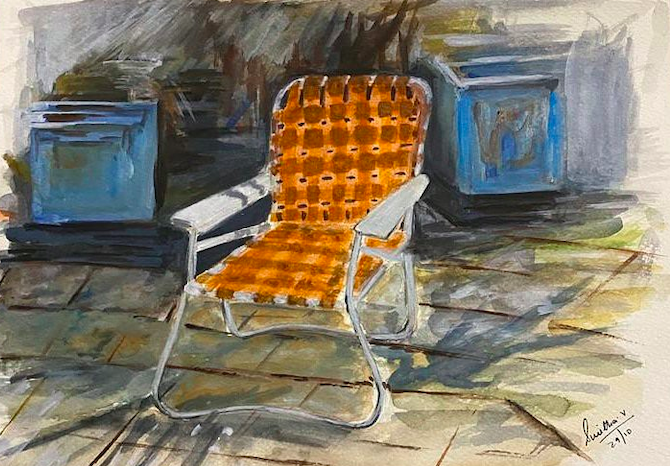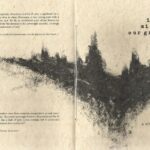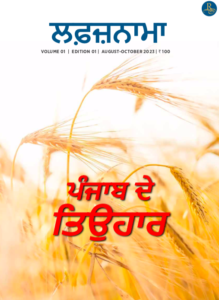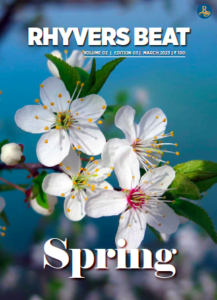Book Review: In the mirror, our graves
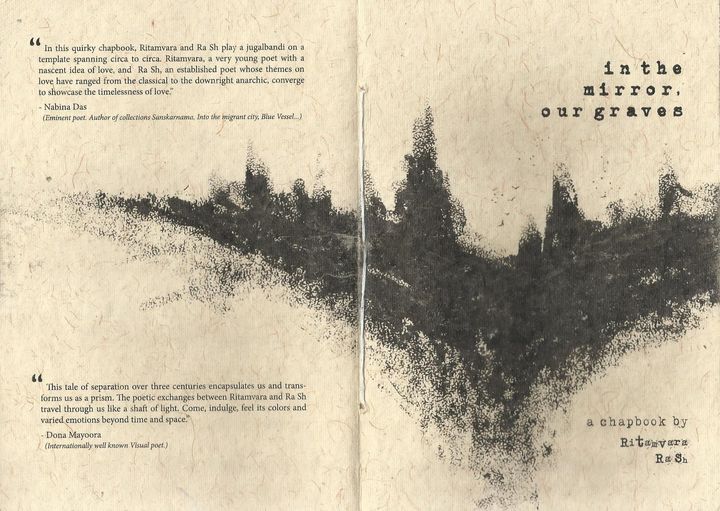
A tale of separation over three centuries
a chapbook by
Ritamvara Bhattacharya and Ra Sh
Imperial Press
This collaborative venture by two poets I admire, Ritamvara Bhattacharya and Ravi Shankar N, [Ra Sh], is a collection of poems which curdles the heart, churns it in many different ways , leaving the reader a totally different person after he \ she finishes reading this beautiful poetic venture. This short and sweet literary offering is indeed going to have a long lasting impact in the field of literature- extraordinary and different as it is. It restores one’s faith in the rejuvenating and reinvigorating power of poetry.
Allow me a little digression here.
I can never forget the visit of the petite, young poet, Ritamvara Bhattacharya to our house in Jaipur, some seven years back, travelling all the way from Banasthali in a ramshackle bus, spending the night in my house and flying back to Kolkata the next morning, leaving behind her rejuvenating poetic fragrance.
It was that poetic fragrance that I breathed again in her collaborative poems. Soft, tender, exquisite. Lingering. Like ‘A gush of the fresh scent of books from the pine wood almirah’ [1975 CE.]
Through the unusual use of the varying fonts in this exquisite chapbook, I guess, the two poets have tried to throw light on the unevenness of life. The ups and downs, the simplicities and complexities. Life is full of vicissitudes- we swing between hope and hopelessness, between joy and sorrow, between yearnings and apparent indifference – but in all this, love reigns supreme, unmanacled- free, as Rumi says and they quote, “Lovers don’t finally meet somewhere. They’re in each other all along.” Love buried for millennia remains quiescent, but is always there- alive and breathing through centuries.
Love is like the moon that waxes and wanes
Wane it may, but can it be fettered by the fear of loss. – Ritamvara Bhattacharya
When we wait for the Other
The sea evaporates shore to shore
One shore burns like lava
The other crystallizes like ice. – Ra Sh
The poems are esoteric and mystifying, whispering in soothing lyrical cadences of absence, presence, yearning, craving, death, pain, remembrance and unremembrance.
Breathtaking in its beauty, the cover has a bewitching quality, and one can glimpse hazy contours of trees, birds and two silhouettes sketched in strokes of charcoal .The sepia parchment paper cover has beautifully strung the handful of pages together with thread. To me, the thread hints at a tenuous life, and the fragility of everything. Devnarayan Prasad, Anand Ayanikatt with the design of the book and the exquisite touches inside and the poets with twenty short, lyrical poems have magically turned this chapbook into a memorable artefact to be forever cherished.
The poems have a seamless flow, none of the poems revealing who the poet is, whether man or woman. Giving the reader the impression that they have been written in different centuries, the first in 1975, where we find one of the lovers sleeping ‘at the edge of the bed’, “I, however, look at us – there are no mirrors”.
The poets take the readers to and fro through centuries 19th, 20th, 21st, and you find yourself metamorphosing into a memory archivist- delving into memories of different centuries, where the overpowering emotion is that of love.
1975 CE
“I sleep at the edge of my bed
rehearsing the movement of your fingers,
until it reaches my soft spot.
Your fingers like blindfolds on my skin wait for me to pause –
to hold your arms to refuse to look at the clock to be the silence.
I, however, look at us – there are no mirrors.
A gush of the fresh scent of books from the pine wood almirah fills the void.”
1985 CE, a very powerful poem ends with the following two lines:
“On my bed is a feather pristine white
its edge smeared with the blood of memories.”
Yes, it is all about memories- memories of love lost- love regained- love rising from its burial ground, once again spreading its aroma all around.
1955 CE greatly intrigued me, and I kept going back to it, reading it loud- louder, till it became a crescendo. That is what these poems do to the reader. You want to read and reread, trying to read between the lines too- and the last lines of this poem kept ringing in my ears- they are still ringing-
“Does Begum Akhtar still bleed thumris
on a moonlit night as this? “
I cannot stop myself from sharing the entire poem here:
“I don’t toss on the bed at the cry of Aazan,
nor do I whimper at the strumming of Bhimpalasi
raag in sitar on dead afternoons,
nor do I hear the heavy sound of the gong from
the nearby Kali temple.
Kirtan on distant winter nights is not a
reminder
of collective hope any more.
I don’t wink at the fluttering of Buddhist prayer
flags
nor do I return a smile at the thirsty boy with
a coloured face mimicking God for the Charak festi-
val.
I lay asleep.
Love is the absence of it.
Does Begum Akhtar still bleed thumris
on a moonlit night as this?”
2025 CE
I go jogging
to the river.
I stand on the bridge and watch
the river flowing among the rocks.
The crematorium is by its bank.
I walk there. I do the ceremonies.
I open the gas chamber.
Set the gas flowing.
I lie down on the platform.
Slide myself into the chamber.
I see myself catch fire.
I wonder why the fire is so cool.
I shiver in the heat.
I hear a fire engine screaming on its way.
I immerse myself in the river.
At the bottom, I find a green glass bangle.
I hear you laughing like the clinking bangles.
Is this poem written by a man, a woman? Can a man’s laughter be not akin to the clinking of glass bangles? You find yourself wondering. The poets have not intended the reader to know the gender of the writer, and this is what the reader does, reading on, not trying to gauge who has written what.
Again I cannot stop myself from sharing one entire poem, which drives home the inconsequentiality of time. Whatever the century,
“We know we were and
we will be.” Lovers go on in all centuries, time in immaterial.
1885 CE
You know, waiting for you,
I have conquered Time that
asks of me silliest questions
like which century
which millennium is this.
We know that Time
is inconsequential.
It may be 630 BC or
1111 CE or 2123 CE.
We know we were and
we will be.
The city clock shows 10PM,
the calendar shows Sept 11 2020.
I know you burned this calendar
when you went away. I know I
burned this clock with me in
the crematorium. The green bangle
I picked up from the river showed 1111 CE. The stone that lay
near it showed 630 BC.
We were and we are.
At this moment I am submerged
in this river, counting the stars that
drowned while we lived.
In The last poem, 2020 CE, an immensely sad poet stands in front of the foggy mirror, feeling that a requiem is being sung for him:
“The mist covered my eyes. When I opened them
again, I found two graves in the mirror.
Slowly, the world buried us in two mirroring coffins.
We lay there silently for many millennia.”
Let me conclude by saying that this chapbook is indeed a bold innovation, something which every lover of poetry should read, and be serenaded by its aura of mystique and evocative notes. Some poems hit you headlong-
“Like a meteor you hit me headlong
and I stumble back with a cry” [1985 CE]
Indeed, some poems are powerful poetic punches making you reel, and it takes you quite a lot of time to recover from its impact.
You also realize that a lover’s departure does not leave the other crestfallen, on the contrary, despite the torture, he\ she clings on to hope,
“but I learned that the heart does not stop
even when left alone. Silently it lives on
waiting for your delicate touch again”.2045 CE
Surreal, sensuous, sensitively penned, these poems are hushed voices making you taste absence, ‘cold tears’, ‘humid hymns’, carrying the aroma of burnt-out candles, ‘in a maze between memory and remembrance’. A unique book about time, love, and the timelessness of love. Centuries pass, but love remains, so do lovers in different garbs, under different names.
A book to be read and savored like a much-loved cup of tea or coffee which one does not want to end. A must-read for every lover of poetry.



